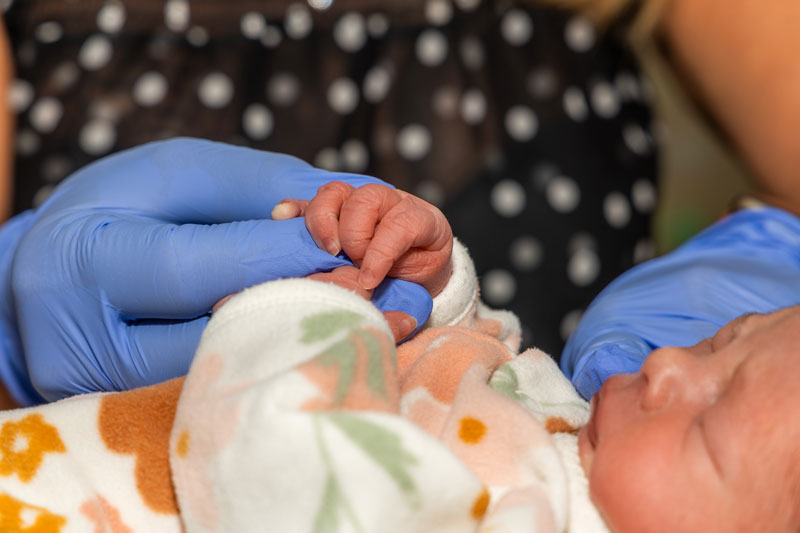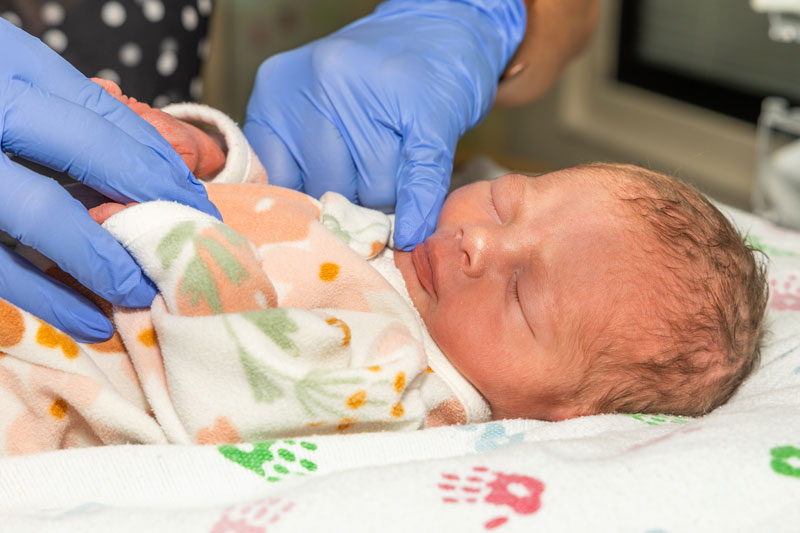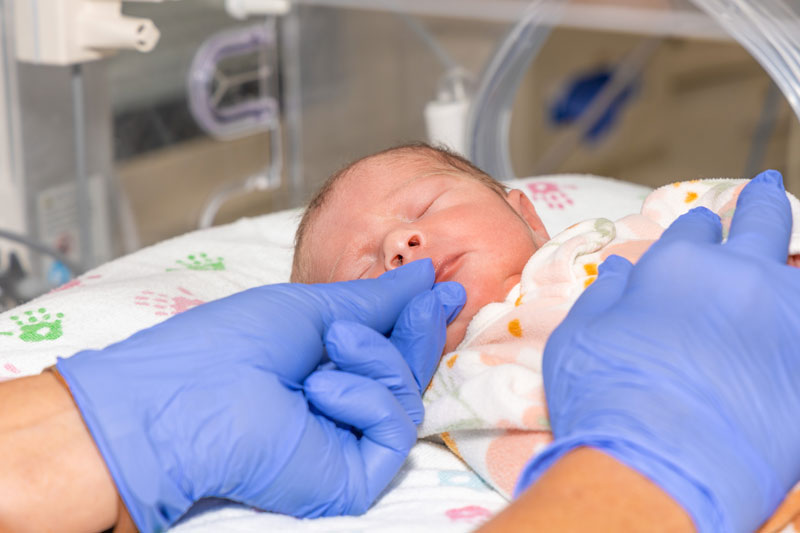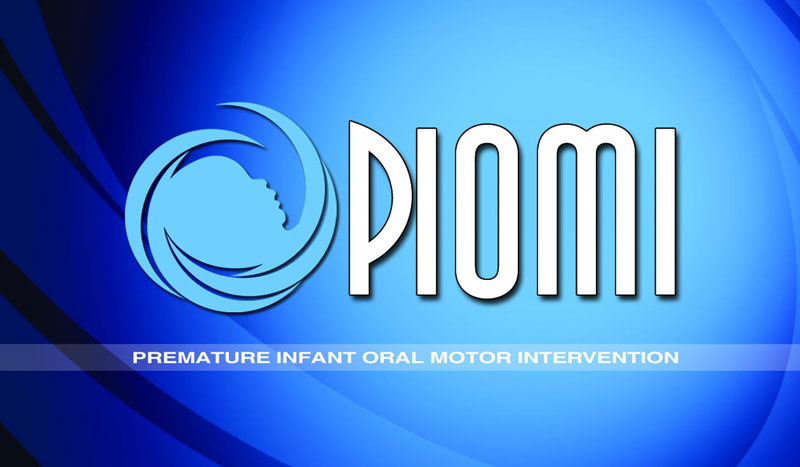Handmade Miracles
Story by Chris Francis '13
Brenda Lessen Knoll '89 is a scientist, but when she first read about the neurological milestones of premature infants treated with Premature Infant Oral Motor Intervention (PIOMI), her groundbreaking physical therapy meant to help vulnerable newborns learn to feed, she was overcome with emotion.

Among the now more than 50 studies, and counting, that expand on her work, “Somebody decided to test the neurological development after discharge of preemies who got PIOMI versus those who didn’t, even though PIOMI is just meant to develop feeding skills while in the NICU (neonatal intensive care unit), and they found that the babies who got PIOMI scored higher on every single element of the neurological battery at 6 months of age,” Brenda said, citing results published in the American Journal of Perinatology in 2020.
“That’s when it hit me. This little therapy goes way beyond feeding skills. My husband came home from work and found me bawling. Just bawling. It’s really incredible,” she said.
Another study published two years later in the European Journal of Molecular & Clinical Medicine expanded to cover 1-year-old toddlers who were born prematurely.
“[Those who received PIOMI therapy] scored higher on fine motor, gross motor, social-personal interaction and language skills,” Brenda said.
For years, PIOMI has been adopted worldwide as an effective treatment for premature infants. With this research, it was even more certain that the treatment, administered with only the caregiver’s fingers, worked better and in more ways than Brenda had ever imagined.
· · ·
Brenda, the daughter of a practicing nurse and nursing instructor, had always planned to go into medicine. It was when she came to Illinois Wesleyan that she discovered neonatal intensive care.

“I’ve always had an infatuation with little things, and with growing things,” Brenda explained. As a child, her neighbors would bring her abandoned baby animals that she would care for, and as a nursing student in the IWU orchestra, she played the E♭ soprano clarinet — the smaller sibling of the common B♭.
“One of our faculty ran an immersive clinical at the NICU in Peoria as an elective,” Brenda said. She credits that opportunity for landing her the first nursing position with the same NICU at St. Francis Medical Center.
When Brenda eventually returned to IWU as an adjunct nursing faculty member herself in 2002, the immersive clinical she had completed no longer existed, so she recreated it. And she expanded the research she was beginning as a Ph.D. candidate into something that would grow exponentially, from a dissertation she never thought would leave the University of Illinois Chicago’s archives into a best practice used worldwide.
· · ·
Brenda first developed PIOMI as a simple form of physical therapy when she was earning her doctorate from the University of Illinois Chicago in 2008. But she was interested in creating something she could perform on much smaller preterm infants than had been done before. No one had ever attempted to deliver oral motor therapy safely to a 2.5 pound baby.
As Brenda explained, “while a baby is in utero, its mouth is filled with amniotic fluid, which helps their tongue and cheeks build range of motion and strength against gentle resistance. There’s all the sensory input that goes to their brain telling them ‘my tongue is here, my palate is here.’” But when infants are born prematurely they are cut off from all that sensory input and the neurological "training" in the womb ends. Instead, they have to rely on caregivers to help them develop the skills they need to feed.

“Days turn into weeks and sometimes months where they don't have any of those inputs that activate neurons to form their brain architecture for feeding,” Brenda said. Because premature infants are extremely sensitive to stimulation, too much of which can cause their breathing and heart rates to slow drastically, caregivers try to stay as hands-off as possible. But Brenda explored whether she could adapt feeding therapies for healthy newborns into a safe regimen for premature infants.
It turned out she could.
Mostly with the use of the caregiver’s pinky finger, “We move their tongue around. We stretch their cheeks, we roll their lips, we press on their gums and palate, all of these things to wake-up the pathways in their brain,” Brenda explained. The initial results were promising with premature infants learning to feed more efficiently and being discharged about a week sooner than those without PIOMI, with no drawback or risk to the patient.
When Brenda’s research was first published in 2011, it exploded. She quickly received emails from caregivers asking her to train them on the therapy, so, after additional studies were published confirming her earlier results, she developed a three-hour PIOMI training seminar series, complete with instruction tools and demonstration videos.
Initially, the key to her method’s utility and popularity was in the speed of a newborn’s discharge. NICUs involve some of the most expensive treatment a hospital provides, where daily costs add up quickly, so moving a patient out of the NICU as quickly as is safe and possible is paramount.
The latest of the research into NICU costs, published by Frontiers in February 2023, comes from the University of Toronto. They found that the median cost for a single NICU admission, spanning days to weeks, was estimated to be more than $77,000, and that’s in Canada. The same treatment costs far more in the U.S., where a trio of premature triplets made The New York Times’ headlines in February 2020 for their $4 million hospital bill.
Studies have shown that PIOMI results in up to a 14 day reduction in the length of their hospital stay. Cutting just a week of treatment would not only send babies home to their families sooner, but it would save at least thousands of dollars. Achieving that with nothing but a caregiver’s fingers is both a miracle and a no-brainer, especially for preterm infants born in countries and regions with fewer health care resources.
Now with 56 published studies on PIOMI, 13 of which were completed since the beginning of 2023, the benefits granted by PIOMI to premature infants’ long-term development are becoming ever clearer.
“Right now I’m pushing for PIOMI to be thought of as a kind of prehabilitation, rather than rehabilitation,” Brenda said — “We need to get in there early to leverage neuroplasticity and train their brains to feed before they are required to actually do the task of feeding.” And it turns out that that early “brain bending” as she calls it, sets up a foundational brain architecture for development in other areas. Far more than an intervention that optimizes efficiency of feeding, it is a therapy that makes vulnerable infants more healthy overall well into their early childhood.
That’s the thought that often makes Brenda feel overwhelmed with emotion.
· · ·
In the 2010s, Brenda traveled all over the world to both teach and expand PIOMI, including a version of the therapy accessible to parents that she developed with colleagues in Italy. As far as Brenda is aware, there are NICUs in 45 countries where PIOMI is implemented as best practice. But, as Brenda notes, the therapy requires no equipment purchased from her or anyone else, it can be taught to nurses, therapists and even parents in a few hours, and it is completely free to use. There’s no reliable way to estimate how far it might have spread, and it can spread very easily.

Anecdotes she has gathered suggest that PIOMI has traveled much farther around the world than she has been able to confirm, and the COVID-19 pandemic contributed even more to this outcome.
Brenda happened to be planning a redesign for her PIOMI website just before March 2020, and the pandemic made it clear where she should pivot. She had done virtual training in the past, but she didn’t anticipate how simple, and even preferable, it would be to offer PIOMI training through an entirely virtual program.
“The webinars are incredibly rich,” Brenda said. In an online training seminar, she can see each face on screen while participants practice the steps on their own or a partners’ mouths, “I can see them demonstrate everything back to me much better than in a huge room.”
Brenda still schedules onsite in person training with NICUS, and has personally trained hundreds of people on PIOMI, now with online seminars that can accommodate as many as 70 attendees about once a month.
As PIOMI expands across the world with more research done by a wider range of nurses, doctors and scientists, Brenda has become the matriarch of the method, helping to foster and direct what PIOMI might become next as more researchers contact her to design and co-author new studies.
Brenda admits that when she developed PIOMI for her dissertation work, she was not sure the therapy would even work, and was just happy to complete the study and graduate with her PhD. “The expansion of PIOMI from a little idea to a best practice model used across the world was not something I planned” Brendad said. But, as Brenda sees it, “I’m just hiding out here in the cornfields of the Midwest watching it grow.”
· · ·
She believes it was her education at IWU that most enabled her achievements. “I think IWU prepares us to think big,” she said. “We say we’re preparing students to be global citizens, so it’s natural to go beyond our borders and immerse ourselves in different cultures of care.”

IWU has reciprocated the praise, granting her the Excellence in Scholarly Work Award in recognition of her research on PIOMI at the beginning of the fall 2023 semester.
“We’re also always talking about how in nursing one must practice within a very interdisciplinary model,” Brenda continued. “We collaborate with lots of different healthcare disciplines, which makes it natural for me to create something that moves between nursing and physical therapy, which isn’t my original discipline.”
She concluded, “PIOMI is a perfect example of a truly interdisciplinary intervention that ended up weaving itself throughout the globe, and it all started at IWU.”